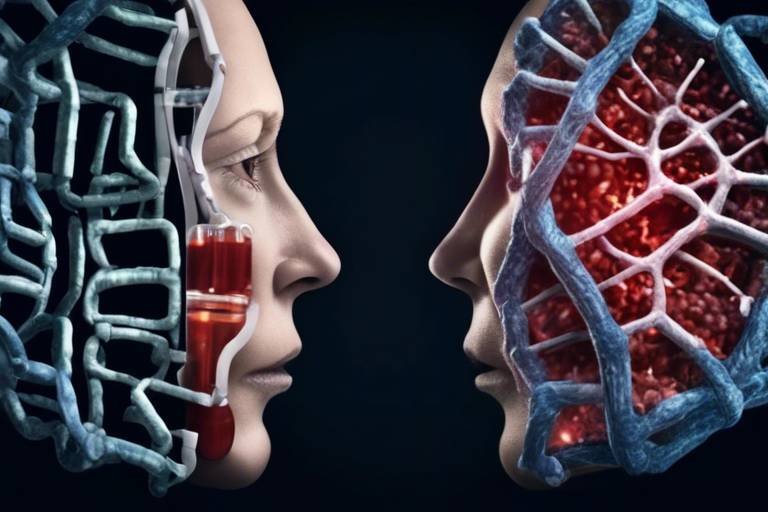The Merging of Philosophy and Science in AI Ethics
The intersection of philosophy and science in the realm of AI ethics is not just a meeting of minds; it’s a vibrant dialogue that shapes the future of technology. As artificial intelligence becomes increasingly integrated into our daily lives, understanding the ethical implications is more crucial than ever. Imagine AI as a double-edged sword; it has the potential to revolutionize industries, enhance our lives, and solve complex problems, but it also poses significant risks if not guided by sound ethical principles. In this article, we’ll dive deep into how philosophical frameworks and scientific methodologies converge to inform AI ethics, ultimately influencing technology, society, and our moral responsibilities.
At the heart of AI ethics lies a fundamental question: how do we ensure that the technologies we create serve humanity positively? This question requires us to examine not just the capabilities of AI but also the ethical frameworks that guide its development. By merging the analytical rigor of science with the moral contemplations of philosophy, we can forge a path that prioritizes human values while embracing innovation. This synergy is essential in navigating the complex landscape of AI, where decisions made today will echo into the future.
As we explore this merging of disciplines, it’s vital to recognize the implications of our choices. For instance, consider the role of bias in AI systems. Philosophical discussions around fairness and justice can inform scientific approaches to data collection and algorithm design, ensuring that AI technologies do not perpetuate existing inequalities. This is where the beauty of interdisciplinary collaboration comes into play. By bringing together ethicists, scientists, and technologists, we can create a holistic understanding of the challenges we face and develop solutions that are not only effective but also ethical.
Furthermore, the ethical implications of AI extend beyond individual technologies; they permeate our societal structures and norms. As AI systems take on more decision-making roles, we must grapple with questions about accountability and transparency. Who is responsible when an AI makes a mistake? How do we ensure that these systems operate in a way that reflects our shared values? These questions illustrate the need for a comprehensive framework that integrates both philosophical inquiry and scientific evidence.
In conclusion, the merging of philosophy and science in AI ethics is not merely an academic exercise; it is essential for shaping a future where technology serves the greater good. By embracing this interdisciplinary approach, we can better navigate the ethical challenges posed by AI and ensure that our innovations align with our moral responsibilities. As we move forward, let’s remember that the choices we make today will have lasting impacts on society, and it is our duty to make those choices wisely.
- What is AI ethics? AI ethics refers to the moral implications and considerations surrounding the development and deployment of artificial intelligence technologies.
- Why is the merging of philosophy and science important in AI ethics? This merging allows for a more comprehensive understanding of ethical dilemmas, ensuring that both theoretical principles and empirical evidence inform decision-making.
- How can bias in AI systems be addressed? By applying philosophical discussions on fairness alongside scientific methodologies for data analysis, we can identify and mitigate biases in AI systems.
- What role do interdisciplinary collaborations play in AI ethics? Collaborations among ethicists, scientists, and technologists can lead to more holistic solutions that consider various perspectives and expertise in tackling ethical dilemmas.

Understanding AI Ethics
AI ethics is a fascinating and crucial field that delves into the moral implications of artificial intelligence. As technology continues to evolve at an unprecedented pace, understanding these ethical principles becomes essential for ensuring that AI serves humanity positively. The conversation around AI ethics isn't just about technology; it's about the very fabric of our society, our values, and our future. So, what exactly does AI ethics encompass? It includes a variety of issues such as bias, accountability, and transparency. Each of these elements plays a significant role in the development and deployment of AI technologies.
To put it simply, think of AI ethics as the moral compass guiding the creation and use of AI systems. Without this compass, we risk navigating through uncharted waters without a map, which can lead to disastrous consequences. For instance, consider the implications of biased algorithms that perpetuate inequality. If we fail to address these biases, we could end up reinforcing stereotypes and discrimination, which is the last thing we want in a progressive society.
Moreover, accountability in AI is a pressing concern. Who is responsible when an AI system makes a mistake? Is it the developer, the user, or the AI itself? These questions highlight the complexity of moral responsibility in the age of artificial intelligence. Transparency also plays a critical role; people need to understand how AI systems make decisions. Without transparency, trust erodes, and skepticism grows, which can hinder the adoption of beneficial technologies.
In essence, understanding AI ethics is not just an academic exercise; it's a necessary endeavor for anyone involved in the tech industry. It requires a multidisciplinary approach, combining insights from philosophy, sociology, and computer science to create a holistic understanding of the ethical landscape. As we move forward, embracing a framework that prioritizes ethics in AI development will be vital for fostering a future where technology enhances human well-being rather than detracts from it.
- What is AI ethics? AI ethics refers to the study of moral implications and responsibilities associated with artificial intelligence technologies.
- Why is understanding AI ethics important? It is crucial for ensuring that AI technologies are developed and deployed in ways that are fair, accountable, and transparent.
- What are some key issues in AI ethics? Key issues include bias, accountability, and transparency.
- How can we ensure ethical AI development? By adopting interdisciplinary approaches that integrate insights from various fields, including philosophy and science.

Philosophical Foundations of AI Ethics
The realm of AI ethics is deeply rooted in philosophical principles, providing a robust framework for understanding the moral implications of artificial intelligence. At its core, philosophy challenges us to think critically about the nature of right and wrong, and how those concepts apply to the rapidly evolving landscape of technology. By examining ethical theories such as utilitarianism, deontology, and virtue ethics, we can better navigate the complex decisions that AI presents. Each of these frameworks offers unique insights, helping us to grapple with questions about accountability, fairness, and the societal impact of AI systems.
Utilitarianism, for instance, encourages us to consider the consequences of our actions, aiming for the greatest good for the greatest number. This raises intriguing questions about how we prioritize outcomes in AI development. Are we designing systems that truly benefit the majority, or are we inadvertently creating disparities that favor certain groups over others? On the flip side, deontological ethics emphasizes the importance of adhering to moral rules and duties, regardless of the outcomes. This perspective compels us to respect individual rights and dignity, suggesting that certain actions may be inherently wrong, even if they lead to beneficial results.
Moreover, virtue ethics shifts the focus from rules and consequences to the character and intentions of the individuals involved. It prompts us to ask: what kind of ethical virtues should AI developers embody? Should they prioritize honesty, empathy, and fairness? By reflecting on these questions, we can cultivate a more responsible approach to AI development that aligns with our shared human values.
Ultimately, the philosophical foundations of AI ethics serve as a guiding light, illuminating the path toward responsible innovation. As we integrate these ethical theories into our technological practices, we not only enhance our understanding of AI's implications but also foster a culture of accountability and transparency. This is essential in ensuring that as AI continues to evolve, it does so in a manner that respects both individual rights and collective well-being.
To illustrate the interplay between these philosophical frameworks and AI ethics, consider the following table that summarizes key aspects:
| Ethical Framework | Key Focus | Implications for AI |
|---|---|---|
| Utilitarianism | Consequences and outcomes | Prioritizes the greatest good; raises questions about bias and fairness |
| Deontology | Duties and rules | Emphasizes respect for individual rights; challenges us to adhere to ethical standards |
| Virtue Ethics | Character and intentions | Encourages ethical virtues among developers; promotes a culture of responsibility |
In conclusion, the philosophical foundations of AI ethics are not just academic concepts; they are vital tools that can help us navigate the moral landscape of artificial intelligence. By embracing these frameworks, we can work towards creating AI technologies that are not only innovative but also ethically sound, ensuring that they serve the best interests of society as a whole.

Utilitarianism in AI
Utilitarianism, a philosophical doctrine that champions the idea of achieving the greatest good for the greatest number, plays a pivotal role in shaping the ethical landscape of artificial intelligence (AI). When we apply this principle to AI, we are confronted with a myriad of questions that challenge our understanding of morality in technology. For instance, how do we prioritize outcomes when developing AI systems? What trade-offs must we consider to ensure that technological advancements benefit society as a whole?
In the realm of AI, utilitarianism prompts us to evaluate the consequences of our decisions. Imagine a self-driving car faced with a sudden obstacle. The vehicle must decide whether to swerve and potentially harm its passengers or continue on its path, risking the lives of pedestrians. Such scenarios epitomize the utilitarian dilemma: how do we measure the 'greater good' in life-and-death situations? This is where the beauty and complexity of utilitarianism come into play, as it urges developers to think deeply about the implications of their algorithms.
Moreover, utilitarianism encourages the use of data-driven approaches to assess the outcomes of AI systems. By analyzing vast amounts of data, we can better understand the potential impacts of AI on various demographics. For example, consider the deployment of an AI system in healthcare. A utilitarian perspective would advocate for algorithms that maximize patient outcomes across the largest population possible, even if this means some individuals may not receive personalized care. This brings us to a critical point: while striving for the greatest good, we must also be wary of the potential for bias and discrimination that could arise from such a one-size-fits-all approach.
However, the application of utilitarianism in AI is not without its critiques. Critics argue that an unwavering focus on outcomes can lead to the neglect of individual rights and liberties. For instance, if an AI system prioritizes efficiency over privacy, it may inadvertently compromise personal data security. This tension between collective benefit and individual rights is a central theme in the discourse surrounding AI ethics. To navigate this complexity, it is vital to strike a balance between utilitarian goals and the respect for human dignity.
In summary, while utilitarianism presents a compelling framework for evaluating the ethical implications of AI, it also raises significant questions about how we define 'the greater good.' As we continue to integrate AI into our lives, we must remain vigilant in addressing these challenges, ensuring that our pursuit of technological advancements does not come at the expense of ethical integrity.
- What is utilitarianism? Utilitarianism is a moral philosophy that advocates for actions that promote the greatest happiness for the greatest number of people.
- How does utilitarianism apply to AI? In AI, utilitarianism helps evaluate the consequences of decisions made by algorithms, focusing on maximizing positive outcomes for society.
- What are the critiques of utilitarianism in AI? Critics argue that utilitarianism may overlook individual rights and lead to ethical dilemmas where the needs of the few are sacrificed for the many.
- Can AI be developed ethically using utilitarian principles? Yes, but it requires careful consideration of both collective benefits and individual rights to ensure a balanced approach.

Consequentialism and AI
Consequentialism, a branch of ethical theory, places emphasis on the outcomes of actions rather than the actions themselves. When it comes to artificial intelligence (AI), this perspective becomes particularly significant. Imagine a world where AI systems are making decisions that impact millions of lives; the question arises: what criteria do we use to evaluate these decisions? In the realm of AI, the focus shifts to the consequences of algorithms and the results they generate. This approach can lead to a more pragmatic understanding of the ethical landscape surrounding AI technologies.
For instance, consider an AI system designed to optimize traffic flow in a bustling city. A consequentialist viewpoint would advocate for measuring the success of this system based on its ability to reduce congestion and improve overall travel times. However, this raises important questions about whose needs are prioritized. Are we optimizing for the majority, or are we considering the impact on marginalized communities who may not benefit equally from these improvements? This is where the challenge lies: balancing the benefits against potential harms.
Moreover, the evaluation of AI outcomes often requires robust data analysis. This is where empirical evidence plays a crucial role. By gathering data on how AI systems perform in real-world scenarios, we can better understand their consequences. For example, a table showcasing the performance metrics of different AI algorithms in traffic management might look like this:
| AI Algorithm | Average Travel Time (minutes) | Accident Rate (per 1000 trips) | Public Satisfaction (%) |
|---|---|---|---|
| Algorithm A | 25 | 0.5 | 85 |
| Algorithm B | 20 | 0.3 | 90 |
| Algorithm C | 30 | 0.7 | 70 |
This table illustrates how different algorithms yield varying results, prompting further investigation into the ethical implications of choosing one over the others. While Algorithm B may minimize travel time and accidents, it is essential to consider the broader societal impacts, such as how these improvements affect different demographics.
In conclusion, consequentialism provides a framework for evaluating AI systems based on their outcomes, yet it also invites scrutiny regarding the fairness and equity of those outcomes. As we continue to integrate AI into our daily lives, understanding the implications of our decisions will be paramount. The question remains: how do we ensure that the benefits of AI are distributed fairly, and that no group is disproportionately affected by the consequences of these technologies?
- What is consequentialism? Consequentialism is an ethical theory that judges the rightness or wrongness of actions based on their outcomes.
- How does consequentialism apply to AI? In AI, consequentialism focuses on the results produced by AI systems and their impact on society.
- What are the challenges of applying consequentialism in AI? Challenges include ensuring fairness, addressing biases, and considering the broader societal implications of AI decisions.

Critiques of Utilitarianism
While utilitarianism presents a compelling framework for evaluating the ethical implications of artificial intelligence, it is not without its critics. One of the primary concerns revolves around the potential to overlook individual rights in favor of the greater good. Imagine a scenario where an AI system optimizes for overall societal benefit but inadvertently sacrifices the well-being of a minority group. This raises a crucial question: can a system that prioritizes the majority ever truly be ethical?
Critics argue that utilitarianism can lead to morally questionable outcomes, as it often requires difficult trade-offs. For instance, if a self-driving car must choose between hitting a pedestrian or swerving and risking the life of its passengers, a utilitarian approach might prioritize saving the greater number of people. But what about the moral implications of making such a decision? This dilemma highlights the tension between collective welfare and individual rights, a core issue that needs addressing in the realm of AI ethics.
Furthermore, the subjective nature of measuring happiness or well-being complicates the application of utilitarian principles. Different individuals and cultures may have varying definitions of what constitutes the "greatest good." This subjectivity can lead to inconsistencies in AI decision-making processes, potentially resulting in biased outcomes. For example, a system trained on data that reflects the majority's preferences might inadvertently marginalize minority viewpoints, perpetuating existing inequalities.
To illustrate these critiques, consider the following table that summarizes the main arguments against utilitarianism in AI:
| Critique | Description |
|---|---|
| Overlooking Individual Rights | Utilitarianism may sacrifice the rights of individuals for the sake of the majority, leading to ethically questionable decisions. |
| Subjectivity of Happiness | Measuring happiness or well-being can vary greatly among individuals and cultures, complicating ethical decision-making. |
| Potential for Bias | AI systems trained on biased data may reinforce societal inequalities instead of promoting fairness. |
Ultimately, while utilitarianism provides a valuable lens for evaluating the outcomes of AI technologies, it is essential to balance these considerations with respect for individual rights and ethical principles. As we navigate the complex landscape of AI ethics, it's crucial to engage in ongoing discussions that challenge these frameworks and seek a more holistic approach to ethical decision-making.
- What is utilitarianism? Utilitarianism is an ethical theory that suggests that the best action is the one that maximizes overall happiness or well-being.
- Why is utilitarianism criticized in AI ethics? Critics argue it can overlook individual rights and lead to biased outcomes, as it prioritizes the majority's welfare over that of individuals.
- How can we address the critiques of utilitarianism? By incorporating principles from other ethical frameworks and ensuring diverse perspectives in AI development, we can create a more balanced approach.

Deontological Ethics in AI
When we dive into the world of deontological ethics, we encounter a framework that emphasizes the importance of rules, duties, and moral obligations. Unlike utilitarianism, which focuses on the outcomes of actions, deontological ethics insists that certain actions are inherently right or wrong, regardless of their consequences. This perspective is particularly relevant in the realm of artificial intelligence (AI), where the stakes are high and the implications of decisions can have far-reaching effects on individuals and society as a whole.
In the development of AI systems, adhering to deontological principles means prioritizing ethical standards that respect human rights and dignity. For instance, when creating algorithms for decision-making, developers must consider whether these algorithms uphold the rights of individuals, such as privacy and non-discrimination. This approach can help mitigate the risks associated with automated systems that might otherwise infringe upon personal freedoms or propagate existing biases.
One of the key components of deontological ethics is the notion of duty. This concept can be broken down into several critical aspects when applied to AI:
- Respect for Individuals: Every individual should be treated as an end in themselves, not merely as a means to an end. This principle urges AI developers to consider the impact of their technologies on personal autonomy.
- Accountability: Developers and organizations must take responsibility for the actions of their AI systems. This duty extends to ensuring that AI operates within ethical boundaries and that there are mechanisms for addressing grievances.
- Transparency: Ethical AI must be transparent in its operations, allowing users to understand how decisions are made. This transparency fosters trust and empowers individuals to challenge outcomes they perceive as unjust.
Moreover, the application of deontological ethics in AI development raises important questions. For example, how do we ensure that AI systems remain accountable to ethical standards, especially when they operate autonomously? What mechanisms can be established to guarantee that AI respects the moral rights of individuals? These questions are not merely academic; they are vital for the responsible evolution of AI technologies.
As we navigate this complex landscape, it is essential to recognize that deontological ethics does not provide all the answers but rather serves as a guiding framework. It encourages AI practitioners to engage in continuous ethical reflection and dialogue, fostering a culture where ethical considerations are integrated into every stage of the AI development process. In this way, we can work towards creating AI systems that not only advance technology but also uphold our shared moral values.
Q: What is deontological ethics?
A: Deontological ethics is a moral philosophy that emphasizes the importance of rules and duties in determining the rightness or wrongness of actions, regardless of their outcomes.
Q: How does deontological ethics apply to AI?
A: In AI, deontological ethics guides developers to prioritize human rights, accountability, and transparency, ensuring that AI systems respect individual dignity and moral obligations.
Q: Why is accountability important in AI?
A: Accountability ensures that developers and organizations are responsible for the actions of their AI systems, allowing for ethical oversight and the ability to address any harm caused by these technologies.
Q: Can AI systems truly be ethical?
A: While AI systems can be designed with ethical principles in mind, the effectiveness of these systems depends on the commitment of developers to uphold ethical standards throughout the development process.

Scientific Approaches to AI Ethics
In the rapidly evolving landscape of artificial intelligence, the intersection of science and ethics is more critical than ever. As AI technologies become increasingly integrated into our daily lives, understanding the scientific approaches to AI ethics is essential. These methodologies not only guide ethical considerations but also ensure that AI systems are developed with integrity and accountability. By leveraging empirical data and scientific inquiry, we can create frameworks that are not only effective but also just.
One of the key scientific approaches to AI ethics is the use of data-driven decision-making. This method involves analyzing large datasets to identify patterns, biases, and potential ethical pitfalls in AI algorithms. For example, when developing a machine learning model for hiring, data scientists can scrutinize historical hiring data to ensure that the model does not perpetuate existing biases against certain demographic groups. By utilizing empirical data, organizations can enhance transparency and accountability in their AI systems, ultimately leading to more equitable outcomes.
Moreover, the scientific method encourages a culture of experimentation and iteration. Just as scientists conduct experiments to test hypotheses, AI developers can apply similar principles by continuously evaluating and refining their algorithms. This iterative process allows for the identification and rectification of ethical concerns before they manifest in real-world applications. For instance, if an AI system designed for facial recognition is found to misidentify individuals from specific racial groups, developers can adjust their algorithms based on new data and insights to mitigate these biases.
Another vital aspect of scientific approaches to AI ethics is interdisciplinary collaboration. The complexity of ethical dilemmas in AI requires input from various fields, including computer science, philosophy, sociology, and law. By working together, ethicists, technologists, and scientists can create comprehensive solutions that consider diverse perspectives. This collaboration fosters a more holistic understanding of the implications of AI technologies and encourages the development of ethical guidelines that are both practical and principled.
To illustrate the importance of interdisciplinary collaboration, consider the following table, which outlines the contributions of different fields to AI ethics:
| Field | Contribution to AI Ethics |
|---|---|
| Computer Science | Develops algorithms and systems that require ethical considerations in their design. |
| Philosophy | Provides theoretical frameworks for understanding moral implications and ethical dilemmas. |
| Sociology | Analyzes societal impacts and the cultural context of AI technologies. |
| Law | Establishes legal standards and regulations that govern the use of AI systems. |
Furthermore, as we delve deeper into scientific approaches, it becomes evident that ethical AI development is not merely a technical challenge but a societal imperative. The implications of AI technologies extend beyond algorithms; they touch on fundamental human rights and societal norms. Thus, scientists and ethicists must engage in ongoing dialogue to ensure that AI serves as a tool for empowerment rather than oppression.
In conclusion, the scientific approaches to AI ethics emphasize the importance of data-driven methodologies, interdisciplinary collaboration, and a commitment to continuous improvement. By integrating these principles into the development of AI technologies, we can ensure that they align with our ethical standards and contribute positively to society. As we navigate this complex terrain, it is crucial to remain vigilant and proactive in addressing the ethical challenges that arise in the age of artificial intelligence.
- What is AI ethics? AI ethics refers to the moral implications and responsibilities associated with the development and deployment of artificial intelligence technologies.
- Why is interdisciplinary collaboration important in AI ethics? Different fields provide unique insights and expertise that can lead to more comprehensive and effective ethical solutions in AI development.
- How does data-driven decision-making enhance AI ethics? It allows for the identification of biases and ethical concerns through empirical analysis, leading to more transparent and accountable AI systems.

Data-Driven Decision Making
In today's digital landscape, data is often referred to as the new oil, and for good reason. The power of in AI ethics cannot be overstated. By leveraging vast amounts of data, organizations can make informed choices that are not only effective but also ethical. This approach allows for a deeper understanding of how AI systems operate and the implications they have on society.
At the core of data-driven decision making is the ability to analyze empirical data to identify patterns, biases, and potential pitfalls within AI systems. For instance, when developing an AI model for hiring, analyzing historical hiring data can reveal unconscious biases that may inadvertently favor certain demographics over others. By recognizing these biases, developers can take steps to mitigate them, ensuring a fairer hiring process.
Moreover, data-driven decision making enhances transparency. When AI systems are built on solid data foundations, stakeholders can better understand how decisions are made. This transparency is crucial in fostering trust among users and the general public. Imagine a world where AI systems operate like a well-oiled machine, with every cog visible and understandable. This is the goal of ethical AI development.
However, the journey toward effective data-driven decision making is not without challenges. Data privacy concerns, the quality of data, and the potential for misuse are significant issues that must be addressed. For instance, organizations must ensure that the data they collect is not only relevant but also ethically sourced. This raises questions about consent and ownership, which are pivotal in the realm of AI ethics.
To navigate these challenges, interdisciplinary collaboration is essential. By bringing together data scientists, ethicists, and technologists, organizations can create a holistic approach to AI ethics. This collaboration can lead to the development of guidelines and frameworks that prioritize ethical considerations while still harnessing the power of data.
In summary, data-driven decision making is a cornerstone of ethical AI development. It empowers organizations to make informed choices, promotes transparency, and encourages collaboration across disciplines. As we continue to explore the intersection of data and AI ethics, it's vital to remain vigilant about the ethical implications of our decisions, ensuring that technology serves humanity rather than the other way around.
- What is data-driven decision making in AI ethics?
Data-driven decision making in AI ethics refers to the process of using empirical data to inform ethical considerations and decisions in the development and deployment of AI technologies.
- Why is transparency important in AI systems?
Transparency is crucial because it fosters trust among users and stakeholders, allowing them to understand how AI systems make decisions and the data that informs those decisions.
- What challenges are associated with data-driven decision making?
Challenges include data privacy concerns, the quality of data, potential biases, and ethical sourcing of data. These issues must be addressed to ensure responsible AI development.
- How can interdisciplinary collaboration improve AI ethics?
Interdisciplinary collaboration brings together diverse perspectives and expertise, leading to comprehensive solutions that consider ethical implications, technical feasibility, and societal impact.

Interdisciplinary Collaboration
In the rapidly evolving landscape of artificial intelligence, the need for has never been more critical. As AI technologies permeate various aspects of our lives, the ethical dilemmas they present require a concerted effort from multiple fields. Imagine a puzzle where each piece represents a different discipline—ethics, computer science, sociology, and law. When these pieces come together, they create a comprehensive picture of AI ethics that is both nuanced and effective.
This collaboration is essential for several reasons. Firstly, the complexities of AI ethics often exceed the scope of any single discipline. For instance, a computer scientist may develop an algorithm that optimizes efficiency, but without input from ethicists, the potential societal impacts of that algorithm may be overlooked. This is where the magic of collaboration comes into play. By merging insights from various fields, we can ensure that AI technologies are not only innovative but also responsible and equitable.
Moreover, interdisciplinary teams can better address the multifaceted challenges posed by AI. For example, consider the challenge of bias in AI systems. A team comprising data scientists, ethicists, and social scientists can approach this problem from different angles:
- Data Scientists can analyze datasets for potential biases.
- Ethicists can evaluate the moral implications of these biases.
- Social Scientists can provide context on how these biases affect different communities.
This holistic approach not only enhances the quality of the solutions but also fosters a culture of shared responsibility. Each discipline brings its own strengths to the table, creating a synergistic effect that can lead to innovative solutions that might not have emerged in isolation. For instance, an AI system designed to assist in hiring processes can benefit immensely from legal expertise to ensure compliance with anti-discrimination laws, while also integrating ethical considerations to promote fairness.
However, achieving effective interdisciplinary collaboration is not without its challenges. Differences in terminology, methodologies, and priorities can create barriers to communication. To overcome these hurdles, teams must cultivate an environment of open dialogue and mutual respect. Regular workshops, brainstorming sessions, and collaborative projects can help bridge these gaps, allowing team members to learn from one another and build a shared understanding of the issues at hand.
Ultimately, the goal of interdisciplinary collaboration in AI ethics is to create a framework that not only addresses current ethical dilemmas but also anticipates future challenges. As AI continues to advance at a breakneck pace, we must remain vigilant and proactive, ensuring that our ethical frameworks evolve alongside technological innovations. By fostering collaboration across disciplines, we can pave the way for a future where AI serves humanity in a fair and just manner.
- What is interdisciplinary collaboration in AI ethics?
Interdisciplinary collaboration in AI ethics involves experts from various fields—such as computer science, philosophy, sociology, and law—working together to address the complex ethical challenges posed by AI technologies. - Why is interdisciplinary collaboration important?
It is crucial because the ethical implications of AI are multifaceted and require diverse perspectives to ensure that technologies are developed responsibly and equitably. - How can barriers to collaboration be overcome?
Barriers can be overcome through open dialogue, regular communication, and collaborative projects that foster mutual respect and understanding among team members from different disciplines.
Frequently Asked Questions
- What is AI ethics?
AI ethics refers to the moral implications and responsibilities associated with artificial intelligence technologies. It tackles issues such as bias, accountability, transparency, and the broader societal impacts of AI, ensuring that these technologies are developed and deployed responsibly.
- How does philosophy contribute to AI ethics?
Philosophy provides the foundational frameworks for understanding ethical decision-making in AI. Concepts like utilitarianism, deontology, and virtue ethics offer different perspectives on how we should approach moral dilemmas in AI, guiding the development of ethical standards and practices.
- What is the role of utilitarianism in AI?
Utilitarianism in AI emphasizes achieving the greatest good for the greatest number. It raises important questions about how to prioritize outcomes and navigate the trade-offs that come with technological advancements, ensuring that the benefits of AI are maximized while minimizing harm.
- What are the critiques of utilitarianism?
While utilitarianism provides valuable insights, it faces critiques for potentially overlooking individual rights in favor of collective benefits. This debate is crucial in shaping AI practices that balance both societal good and individual dignity.
- How does deontological ethics apply to AI?
Deontological ethics focuses on duty and adherence to rules rather than outcomes. In AI, this perspective emphasizes the importance of following ethical principles and respecting human rights, ensuring that AI systems operate within a framework of moral responsibility.
- What scientific approaches are used in AI ethics?
Scientific methodologies contribute empirical data to AI ethics, facilitating evidence-based decision-making. Data-driven approaches help identify biases, improve transparency, and ensure that ethical considerations are grounded in real-world evidence.
- Why is interdisciplinary collaboration important in AI ethics?
Interdisciplinary collaboration brings together scientists, ethicists, and technologists to address complex ethical dilemmas in AI. By combining diverse perspectives and expertise, this collaborative approach fosters comprehensive solutions that are more effective and inclusive.



















